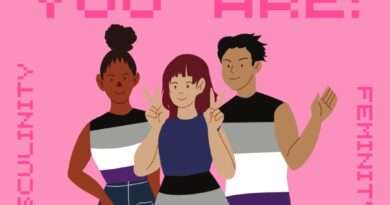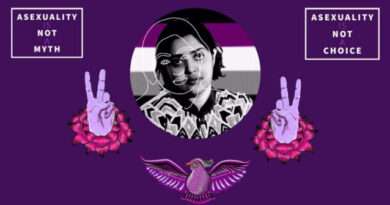An Aro Pierced my Heart: Who I am and Why I am Proud
Aromantic is an often overlooked LGBTQIA identity, generally defined as ‘a person who feels little to none romantic attraction’. With regard to aromanticism, people tend to have many questions, most centred around the question of what romantic attraction actually constitutes of and discourse about whether it is even an LGBTQ+ identity, or even whether it is a valid identity.
Aromantic as a term was popularised through Tumblr around 2010, making the term less than a decade old. The term gained recognition as more and more people started to identify as aromantic. Who is an aromantic? What does it mean? These are questions which are difficult to answer, however, it is easy to say who an aromantic isn’t. Aromanticsm isn’t congruent with asexuality- however, they’re separate identities which may intersect (aro-ace).
But what do people perceive of the aromantic identity? Unfortunately, even though the LGBT+ community is meant to be a safe place for all those aren’t cishet (or straight in common parlance), there are those gatekeepers who are unwelcoming to newer identities like ace and aro, claiming that we are not ‘queer’ enough. But what is queer but someone who does not fit into the heteronormative and cis-gendered structure established and enforced by society? Aromantics are queer, we are queer enough- by being aromantic, we fall outside heteronormative rules of society; we definitely don’t form part of the cishet community. This creates a paradox for us- neither are we welcomed in the cishet community nor in the LGBTQ+ community.
Some gatekeepers in the LGBTQ+ claim that on top of being not being queer enough, we are also not marginalised enough? They ask us, “The LGBT+ population has suffered violence, death and abuse, what have you suffered to qualify?” Not only can this be a misleading category for being a part of the of the community, it is plain gatekeeping which fails to recognise the issues surrounding the aromantic identity.
Aromantic Erasure. Due to being ignored by the LGBT+ community, the identity is overlooked by the common masses and is not known. If it happens to be known, it is dismissed as a myth, a childlike fantasy- “You’ll meet the right person some day.” “That’s not a real identity!” As a result, we get neither representation nor recognition in the media; take Jughead in Netflix’s Riverdale as a prime example. He was always meant to be an aromantic-asexual character but in the series, he is involved in both ssexual and romantic relations. So, what’s the problem? We are not heard, seen or acknowledged. Many people don’t know what aromantic means, and others are denied of their identities for the longest time? Why? No one told them such a thing existed, that it was valid. Imagine the conflict they could have avoided if they had just been told.
Forced Marriages. Often, aromantics are not interested in marriages, the pinnacle of romantic relationships. So what does it mean in an Indian society which cannot accept such ‘wild and liberal western ideals’? The solution is simple in many Indian households, “Since my son or daughter cannot bring this type of shame upon our family, we are going to find a suitable wife or husband and marry them off? My child doesn’t want to get married? Whatever, it’s not their choice.”
Being aromantic comes with a whole set of its own problems- maybe they are not as severe as the bloodied history of the LGBT community, but it is still important; all people are important. And isn’t that what the LGBT community is supposed to be about? All human beings are equal regardless of their orientation and gender? Because if you claim this but do not support and welcome us, in my humble opinion, you are a hypocrite; nothing you say can make me less proud of being an aromantic.



